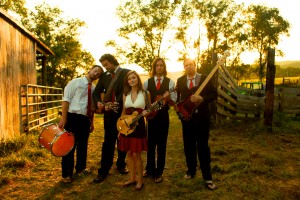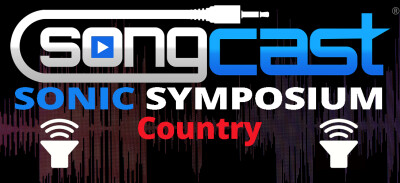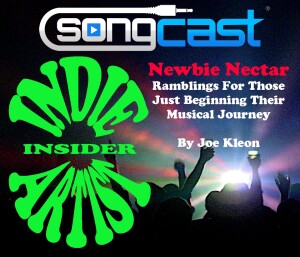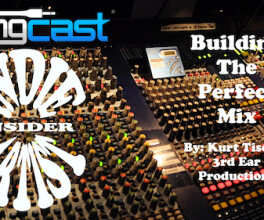This week we sat down for a chat with New York City based independent band 2/3 Goat. Their musical fusion of folk, blues, rock, and country summons the likes of Cash & Carter, with a contemporary spin. On November 20th they will release their sophomore album Stream of Conscience – which was recorded entirely on vintage equipment — along with a music video for the title track, taking a stance against mountaintop removal coal mining.
 Stream of Conscience was recorded in Nashville, TN at Welcome to 1979 studios; a retro, all analog recording studio that caters to independent and budget minded artists, producers and engineers. With fully restored analog tape machines, console, outboard equipment and microphones, Welcome to 1979 also has tons of vintage gear and over 7,000 square feet of recording and recreational space.
Stream of Conscience was recorded in Nashville, TN at Welcome to 1979 studios; a retro, all analog recording studio that caters to independent and budget minded artists, producers and engineers. With fully restored analog tape machines, console, outboard equipment and microphones, Welcome to 1979 also has tons of vintage gear and over 7,000 square feet of recording and recreational space.
We wanted to hear about 2/3 Goat’s experience at an analog recording studio, so we sat down with Annalyse McCoy and Ryan Dunn for a chat. Here’s what they had to say:
SongCast: How did you find Welcome to 1979 and what made you decide to work with them?
2/3 Goat (Annalyse): We began touring last year, making our first trip to Nashville in July 2010. We met Chris Mara (of 1979) early this past year through musician friends. He was a super cool guy, and we realized quickly that he had a great ear and a keen insight into tasteful music. We came for our second visit to 1979 and watched him working with a Nashville band in our circle, Max and the Wild Things. Instantly, we fell in love with his way of stepping back and allowing the artists to feel out their sound, while still subtly, skillfully guiding them to produce the best tones possible. It was a very authentic, honest way of going about recording.
Q: What, sonically, were you hoping to get out of the process (when recording in analog)?
A (Annalyse): We were looking for that same authenticity we’d heard during our trip to the studio. Another aspect of the recording process we’d witnessed was that the whole band played together pretty much the whole time. Each person was in a different room and communicated through the headphones. Despite the lack of being able to see each other, this still created an energy that is many times not present in digital recording, when after scratch tracking, every instrument is usually isolated and recorded individually. To us, music is an act that is shared by not just the audience and the musician, but also from musician to musician. Music is live, it’s not canned. So we didn’t want it to sound canned. Recording in this way we felt eliminated the possibility of that happening.
Q: How would you compare your experience when recording in digital?
A (Ryan): The difference between analog and digital, once we heard it in the studio, was night and day to us. Coming from a theatrical background as well as growing up listening to our parents’ albums, we feel in love with the live, vibrant, sound that tape picks up. We feel like we have a very talented group of musicians and we wouldn’t need to do a lot of pitch correction or auto tuning, so we thought, “How cool would it be to try and capture our sound played together on tape?”
Q: What are some of the notable things indie artists should know about the differences between recording in analog vs. digital?
A (Ryan): In the studio, one of the biggest differences we had was that we all got to play as one band, but in separate rooms. So we could isolate the sound, but keep the feeling like a live show. Analog forced to us to have to hit our marks on every take. We were in a financial situation that didn’t allow us to take more than one or maybe 2 takes of a song. So we had to make sure we got the best one and we all had to nail it together. This really got our heads working in unison and sonically created an overall feeling of movement to each song.
In digital recording you are able to lay down as many takes as you need or want to. You can then go back and piece together the best version of all of your takes. In analog, because you are recording onto a physical tape that is large and expensive, you have to either keep what you did or record over it. This is scary because you may really like what you just did, but want it a little better. So you decide to do it again, but then just one of you blows it and plays the wrong chord or coughs, and you lost that great take. It’s a good thing we all get along well.
Q: Anything you’d like to add about the do’s and don’ts of the recording process?
A (Ryan): One of the things I learned for the millionth time is how great a process can be when you work with people who can collaborate well. We know we can’t do everything, and finding someone who is really good at what they can do and is passionate about doing it and likes to listen to what you have to say, is I believe of the utmost importance. Especially when you’re on a budget. We were so lucky to have musicians who wanted to work the songs out and get the best arrangements before we hit the studio. We hired Chris Mara because we loved the sound he was able to capture and create. Then we hired our friend Mikie Martel to mix the album because we loved his ability to “give every sound its sonic home,” as he put it. We took a recommendation from Chris and hired Tommy Wiggins to master the album and it paid off. All three parties were interested in working with each other and us to get the most out of all our talents and the process. This is why Stream of Conscience turned out so well.
A (Annalyse): So the authenticity and honesty we mentioned that we associate with analog is actually the result as well as the cause. It’s not just because we recorded this album analog that we magically came out with an excellent product. You work with genuine people who care about the art, who want to make a great record, and you get great results: a more strategic and successful artist.
Up next: Competitions. Should you enter, and why?
The SongCast Crew











































I totally relate to the concept of analogue recording although I now mix both together my client fellow musicians have told me, is they love the warmth I create and the live feel which makes the sound spectrum feels real. It depends on how your ear perceives the sound as someone who mixed live music for many years as a writer and producer I wanted to create that feel to the listener without compressing everything but in control without distorting or peeking.
Analogue is wild beast it needs to be nurtured as it has an invisible nature and secrets.
Keep your ears alive!
Best Ian Langhorne.